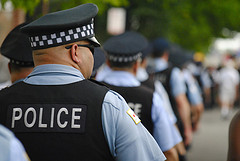 Ars Technica and The Chicago Sun Times report on developments in ACLU v. Alvarez, a case out of the Northern District of Illinois that concerns applicability of the Illinois Eavesdropping Act to audio recordings of police officers carrying out their official duties in public places. The American Civil Liberties Union of Illinois filed the case against Cook County State’s Attorney Anita Alvarez, requesting injunctive relief to prohibit enforcement of the Act in connection with a planned ACLU program to promote police accountability. The Seventh Circuit ruled in favor of the ACLU in May 2012, and the district court has now approved an award of costs and fees totaling $645,549.
Ars Technica and The Chicago Sun Times report on developments in ACLU v. Alvarez, a case out of the Northern District of Illinois that concerns applicability of the Illinois Eavesdropping Act to audio recordings of police officers carrying out their official duties in public places. The American Civil Liberties Union of Illinois filed the case against Cook County State’s Attorney Anita Alvarez, requesting injunctive relief to prohibit enforcement of the Act in connection with a planned ACLU program to promote police accountability. The Seventh Circuit ruled in favor of the ACLU in May 2012, and the district court has now approved an award of costs and fees totaling $645,549.
As described by the Seventh Circuit in its decision last year, the Act generally prohibited the use of eavesdropping devices to hear or record oral conversations without consent. It was amended in 1994 to provide that it applied to “any oral communication between 2 or more persons regardless of whether one or more of the parties intended their communication to be of a private nature under circumstances justifying that expectation.” ACLU v. Alvarez, 679 F.3d 583 (7th Cir. 2012) (citing Ill. Pub. Act 88-677 (1994) (codified at 720 ILL. COMP. STAT. 5/14-1(d))) (emphasis added). The ACLU challenged the constitutionality of the Act under the First Amendment, and the Seventh Circuit agreed that the Act caused cognizable First Amendment harm:
Unlike the federal wiretapping statute and the eavesdropping laws of most other states, the gravamen of the Illinois eavesdropping offense is not the secret interception or surreptitious recording of a private communication. Instead, the statute sweeps much more broadly, banning all audio recording of any oral communication absent consent of the parties regardless of whether the communication is or was intended to be private. The expansive reach of this statute is hard to reconcile with basic speech and press freedoms.
Alvarez, 679 F.3d at 595 (citations omitted).
The Alvarez decision followed a similar ruling in 2011 by the First Circuit in Glik v. Cuniffe, 655 F.3d 78 (1st Cir. 2011), which concerned application of the Massachusetts wiretap statute to recordings of police officers in public places. The Glik case concluded in March 2012 with a $170,000 settlement covering plaintiff’s damages and legal fees.
The Cyberlaw Clinic contributed to an amicus brief that the Reporters Committee for Freedom of the Press filed in the Alvarez case on behalf of itself, Berkman’s Citizen Media Law Project (now known as the Digital Media Law Project), and other media and press organizations.
(Image courtesy of Flickr user Isadora Ruyter-Harcourt pursuant to a Creative Commons Attribution 2.0 Generic, CC BY 2.0, license.)
